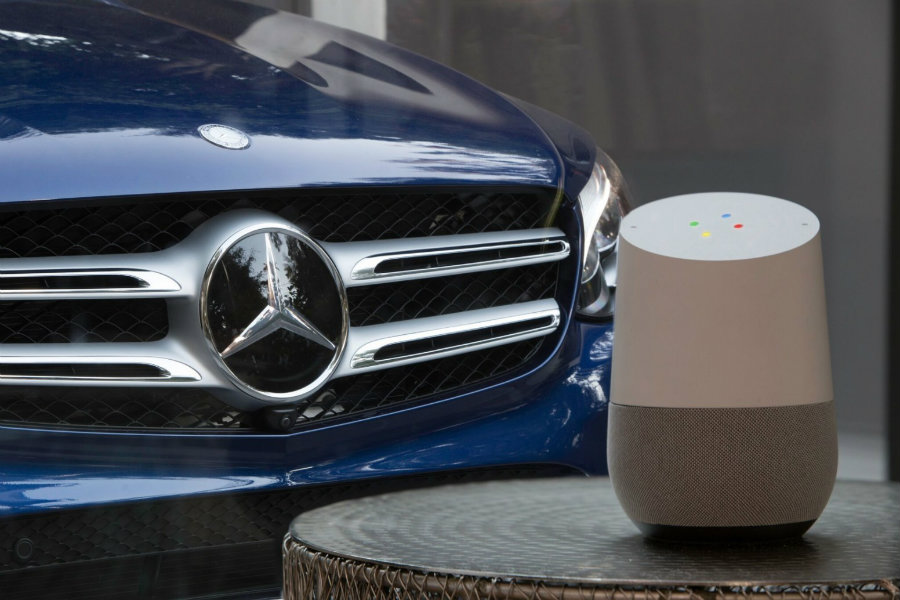Mercedes-Benz just launched a new service that allows customers with new models to communicate and dictate orders to their cars using Google Home or Amazon Echo.
The new feature is available to owners with 2016 and 2017 models. Cars can be remotely started by simply saying “Alexa, start my car” to an Amazon Echo device, and customers in the U.S. will be able to activate several other functions via voice commands.

For example, customers can instruct Alexa to “ask Mercedes to send and address to the car,” and they will receive navigation information and point-of-interest requests. Mercedes Benz noted that the service would be available in Europe later this year.
Mercedes-Benz adds to carmakers using Google Home or Amazon Echo in their services
Nils Schanz, head of Internet of Things and Wearable Integration at Mercedes Benz’s research arm said that the company wants to offer their customers a broad range of services 24/7 and not just when they are in their cars.
“Mercedes Benz’s goal is creating an intelligent ecosystem around cars, and developing cutting-edge technology to make everyday life more convenient for our customers,” said Schanz, according to a press release from Mercedes Benz.
There are several prerequisites for accessing the new system, such as having an active “Mercedes me” account and getting a “mbrace” subscription, which gives access to connected car services. Customers will, of course, also need to own a Google Home or Amazon Echo home automation device.
“In December 2016, Mercedes Benz announced the integration with the Google Assistant on Google Home,” said the Silicon Valley-based company in the press release. “Today, Mercedes Benz is one of the first carmakers to integrate Google Home with their vehicles.”
The company added that the integration of Google Home into their cars signals a significant step forward in Mercedes Benz’s connectivity strategy.

Mercedes’ decision comes after several carmakers like BMW, Ford, and Genesis have released similar services to their customers. BMW recently added Amazon Alexa connectivity to its vehicles, as part of the company’s new cloud service called BMW Connected.
Genesis announced in August 2016 that they had partnered up with Amazon to provide a service to customers of the Genesis G80 and G90 to start their car remotely using an Echo device. Ford, in January 2016, announced the launch of a new service with Amazon, to allow drivers to start their cars remotely.
However, Ford kicked it up a notch adding that the service will also enable customers to control connected devices in their homes while driving. Meaning, drivers can talk to their homes’ Nest thermostats and change the temperature, turn on the lights of the house, and even open the garage door.
Google Home and Amazon Echo are introducing ads
Smart home devices like Google Home or Amazon Echo are being sold more and more each year, as more services are offered to customers with such devices. According to researcher Strategy Analytics, over 1.8 million smart speakers were sold in 2016, and 15.1 million are expected to be sold by 2020.
Recently, Google Home introduced customers with ads, receiving mixed reviews about them. Last week, a Burger King ad appeared on TV, showing a Burger King employee holding a Whopper.
“You’re watching a 15-second Burger King ad, which is unfortunetaly not enough time to explain all the fresh ingridients in the Whopper sandwich. But I got an idea,” says the employee in the ad. “OK Google, what is the Whopper burger?”
People watching the TV commercial who owned a Google Home device heard the speaker give a Wikipedia description of the Whopper. While some customers found the ad amusing and funny, others found it annoying and intrusive.
Ad executives have said that they plan to incorporate more advertising for smart speaker devices and its voice assistants in the future. Advertising firms like 360i say that they’re working to find more utility for how users use the devices, according to CNET, and Droga5 said its ads for smart speakers are coming soon.
The news has alarmed a large number of consumers, who wish not to be disturbed with ads playing on their smart devices. This is not the first time that Google Home sneaks up ads, as last month users found that when they asked the device “what’s my day like?”, the assistant, after providing the requested information, suggested users check out the premiere of Beauty of the Beast.
The Amazon Echo has also embraced ads, as last month Anheuser-Busch released a skill for the device and its voice assistant Alexa, which provides workout routines to beer drinkers who enjoy staying physically active but also enjoy beer. The skill is called ULTRA 95 and combines workout routines with ads for the Michelob Ultra beer.
Source: Fortune
